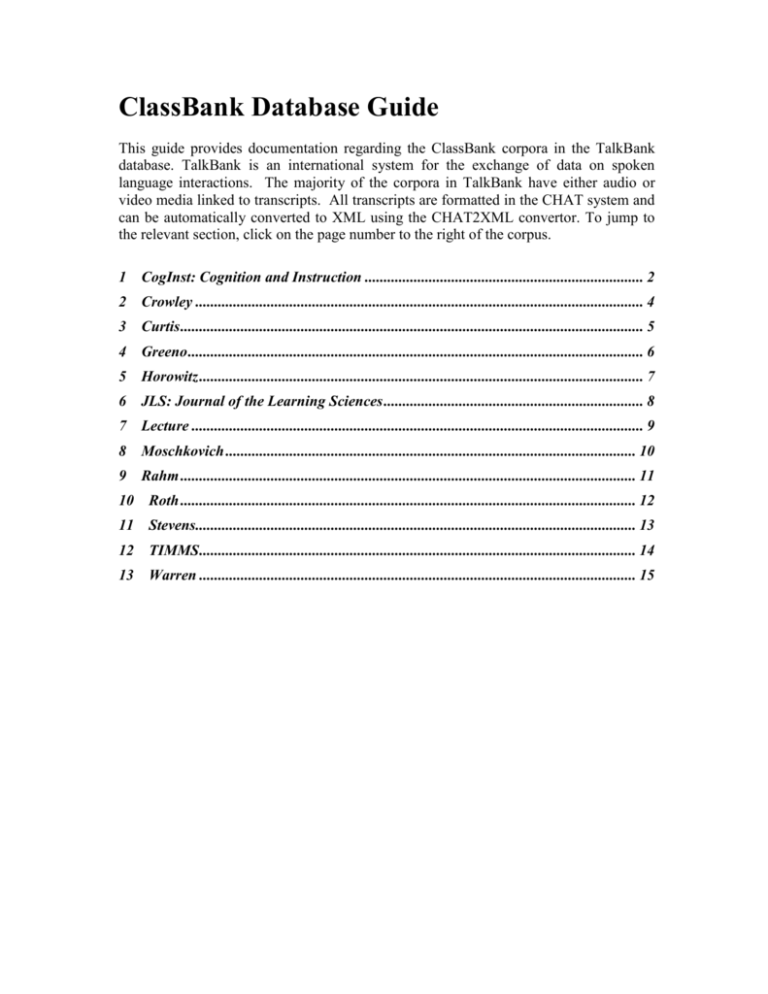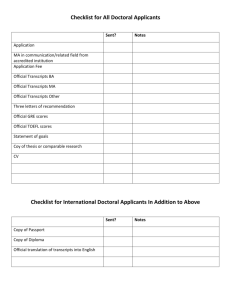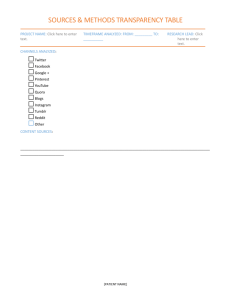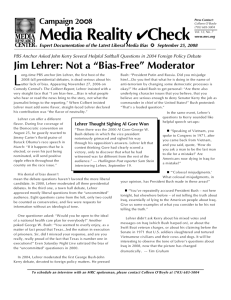ClassBank
advertisement

ClassBank Database Guide
This guide provides documentation regarding the ClassBank corpora in the TalkBank
database. TalkBank is an international system for the exchange of data on spoken
language interactions. The majority of the corpora in TalkBank have either audio or
video media linked to transcripts. All transcripts are formatted in the CHAT system and
can be automatically converted to XML using the CHAT2XML convertor. To jump to
the relevant section, click on the page number to the right of the corpus.
1 CogInst: Cognition and Instruction .......................................................................... 2
2 Crowley ....................................................................................................................... 4
3 Curtis ........................................................................................................................... 5
4 Greeno ......................................................................................................................... 6
5 Horowitz ...................................................................................................................... 7
6 JLS: Journal of the Learning Sciences ..................................................................... 8
7 Lecture ........................................................................................................................ 9
8 Moschkovich ............................................................................................................. 10
9 Rahm ......................................................................................................................... 11
10 Roth ......................................................................................................................... 12
11 Stevens..................................................................................................................... 13
12 TIMMS .................................................................................................................... 14
13 Warren .................................................................................................................... 15
1
Bradford
Dr. Angela Bradford Wainwright, CCC-SLP
Assistant Professor
The University of the District of Columbia
Department of Languages and Communication Disorders
4200 Connecticut Ave., NW, Bldg 41, Rm 426-01
Washington, DC 20008
Tel: 202-274-5546
Fax: 202-274-5360
abradfrd@udc.edu
These 7 audio samples and transcripts were gathered from a larger normative study of
4th and 5th grade African-American children (n=58) answering questions regarding
cultural literacy using the Test of Core Knowledge (Bradford & Harris, 2000). The
article derived from the data is entitled "Cultural Knowledge in African American
Children” (http://lshss.pubs.asha.org/article.aspx?articleid=1780299).
The interview protocol asked the children to tell everything they knew about these
topics:
Christopher Columbus, Pilgrims, George Washington, the Declaration of Independence,
Benjamin Franklin, Abraham Lincoln, the Civil War, the Constitution of the United
States, John F. Kennedy, the atomic bomb, the Industrial Revolution, Martin Luther
King, Jr., the slave trade, the Civil Rights Movement, Harriet Tubman, Frederick
Douglas, the NAACP, Malcolm X, Muhammad Ali, the Ku Klux Klan, the Montgomery
bus boycott, Little Red Riding Hood, Cinderella, an orchestra, The Little House on the
Prairie, The Wizard of Oz, Pinocchio, Elvis Presley, Alice in Wonderland, Peter Pan,
ballet, jazz, Maya Angelou, the Blues, Michael Jackson, B. B. King, Motown, Roots, the
saga of the American family, Aretha Franklin, Sammy Davis, Jr., The Color Purple, Bill
Clinton, Elian Gonzalez, the Columbine shooting, the Oklahoma city bombing, Princess
Diana, Al Gore, the Jonbenet Ramsey case, Steven Spielberg, John F. Kennedy, Jr.,
Mother Teresa, Bill Cosby, Whitney Houston, Jesse Jackson, Michael Jordan, Rodney
King, the Million Man March, Moesha, Spike Lee, Ebonics, O. J. Simpson
#14 - DOB 02/17/89, age 12 at data collection, female
#15 - DOB 11/21/88, age 12 at data collection, female, starts with Pilgrims
#16 - DOB 02/10/89, age 12 at data collection, male, starts with Pilgrims
#17 - DOB 03/11/89, age 12 at data collection, male, starts with Princess Diana
#18 - DOB 08/08/89, age 11 at data collection, female, starts with Pilgrims
#19 - DOB 01/17/89, age 12 at data collection, male, starts with Pilgrims
#20 - DOB 08/15/89, age 11 at data collection, female, starts with Pilgrims
2
CogInst: Cognition and Instruction
Timothy Koschmann
Department of Medical Education
Southern Illinois University
801 Rutledge St.
Springfield IL 62794-9622
tkoschmann@acm.org
Curtis LeBaron
Organizational Leadership
Brigham Young University
Marriott School of Management
Provo UT 84602
lebaron@byu.edu
This corpus includes transcripts linked to video from three problem-based learning
(PBL) sessions with medical students. The three segments include:
1. My Theory: An attempt to diagnose a patient evidencing aspects of anomia,
dysphasia, and some motor control problems.
2. Thrills: A group attempt to characterize precisely the meaning of a “thrill” in the
circulatory system.
3. Risks: A consideration of the relative risks of x-ray and CAT scans.
The first segment was the focus of a special issue of Discourse Processes {Koschmann,
1999 #9609}. All three segments were discussed in further detail in Koschmann and
LeBaron {, 2002 #9612}. The transcription format is CA-CHAT.
Koschmann, T. (1999). Special Issue: Meaning making. Discourse Processes, 27(2), 98167.
Koschmann, T., & LeBaron, C. (2002). Learning articulation as interactional
achievement: Studying the conversation of gesture. Cognition and Instruction, 20,
249-282.
3
Crowley
Kevin Crowley
LRDC Pittsburgh
4
Curtis
Richard Lehrer
Peabody College
Vanderbilt University
Nashville, TN
The Curtis corpus is comprised of digital video of a second-grade classroom
participating in a 14-day Geometry in Design unit (Watt & Shanahan, 1994). These data
originated from an Office for Educational Research and Improvement funded project
conducted by Richard Lehrer between 1992 and 1995. Readers are encouraged to refer
to Jacobson and Lehrer (2000), Strom, Kemeny, Lehrer, and Forman (2001), and Lehrer
et al. (1998) for additional details about the original project.
The transcripts for the Curtis classroom videos were created during Summer 2006 and
2007 using the CHAT transcription system (MacWhinney, 2000). The video data were
transcribed by RaEsa Benjamin-Wardle of Ithaca College and Sarah E. Puckett of
University of Virginia, two Pittsburgh Science of Learning Center summer interns.
Additional transcribers were Joshua Boston, an undergraduate student at Carnegie
Mellon and Marnie Arkenberg, and NIMH postdoctoral researcher.
It is important to note that not all of the video provided by Richard Lehrer have been
transcribed. The transcripts provided were created for the use of a specific project on
children's developing conceptual understanding and pertain only to relevant episodes of
classroom discourse. There are other Curtis corpus videos listed under the audio and
media section of Talkbank.org that have not been transcribed. Much of this
untranscribed data consist of small group work by children, teacher and child interviews,
and computer activities.
5
Greeno
James Greeno
LRDC, Pittsburgh
6
Horowitz
Horowitz, Rosalind
Education
University of Texas
San Antonio, TX 78285
horowitz@lonestar.utsa.edu
This transcript linked to video includes presentations by grade school children on the
habits and functions of camels. In addition there is an introduction to the exercise
presented by the teacher.
7
JLS: Journal of the Learning Sciences
Sfard, Anna
Science Teaching
Hebrew University
Jerusalem, Israel 91905
sfard@netvision.net.il
McClain, Kay
Teaching and Learning
Vanderbilt University
Social Bldg Rm 240
Nashville, TN 37203
kay.mcclain@vanderbilt.edu
This transcript linked to video includes three segments involving the discussion of
aspects of statistical distributions by 7th grade children in Nashville. The video was
published as a special issue of Journal of the Learning Sciences {Sfard, 2002 #9610} in
which seven contributors presented alternative analyses of the interactions.
Sfard, A., & McClain, K. (2002). Special Issue: Analyzing tools: Perspective on the role
of designed artifacts in mathematics learning. Journal of the Learning Sciences, 11,
153-388.
8
Lecture
MacWhinney, Brian
Department of Psychology
Carnegie Mellon University
Pittsburgh, PA 15213
macw@mac.com
This is a transcript linked to video of a one-hour lecture by Brian MacWhinney to
his class in Cognitive Research Methods at CMU in 2000. Only this one hour has
currently been transcribed an linked, although media are available for an additional six
lectures.
9
Moschkovich
10 Rahm
11 Roth
Roth, Wolff-Michael
Cognitive Science
University of Victoria
Victoria, BC Canada
mroth@uvic.ca
This is a transcript linked to video of a lesson in a middle school class on the aerial
geography of the Vancouver area.
12 Stevens
Stevens, Reed
Educational Psychology
University of Washington
Seattle WA
reedstev@u.washington.edu
This corpus includes three transcripts linked to video.
1. Firm. This is a discussion of architectural planning
2. Library. Discussion of counting between two grade schoolers
3. Classroom. A classroom discussion.
13 TIMSS
James Stigler
UCLA
14 Warren
Elizabeth Warren
TERC





